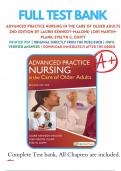, CHAPTER 1: CHANGES WITH AGING
1. Mrs. Smith, 75 Years Old, Reports That She Is Weak, Has Difficulty Urinating, And Is
Dehydrated. Although She Is Afebrile, The Nurse Conducts A Thorough Physical Examination,
Including Urinalysis AndComplete Blood Count (CBC). The Total Assessment Is Necessary
Because:
1. All Body Systems Interact, And Symptoms Could Indicate A Variety Of Diagnoses.
2. The Symptoms Are Vague And May Be Signs Of Aging.
3. There May Be Other Signs Or Symptoms More Indicative Of The Condition.
4. Mrs. Smith May Not Be Reporting All Significant Information. - 1.
ANSWER: 1
Page: 2
Feedback
1.
The Clinician Must Be Aware That All The Systems Interact And, In Doing So, Can Increase
The OlderPerson's Vulnerability To Illness/Disease.
2.
The Nurse Must Not Attribute Symptoms Only To The Aging
Process.3.
There May Be Comorbidities Accompanying This
Condition.4.
Assumptions Of Not Reporting Properly May Not Be True.
2. A Patient With Renal Disease Has Blood Work Drawn, And The Results Show An Increase
In Serum Creatinine. The Nurse Practitioner Needs To Know Which Of The Following
Laboratory Values BeforeOrdering Medications?
1. CBC
2. Culture And Sensitivity Of The Urine
3. Creatinine Clearance
4. Uric Acid Levels - 2.
ANSWER: 3Page: 3
Feedback
1.
A CBC Will Not Evaluate Kidney Function For A Patient With Renal
Disease.2.A Culture And Sensitivity Test Reflects The Presence Of An
Infection And The Antibiotic To Which TheOrganism Is Sensitive.
3.
The Calculation Of Creatinine Clearance Provides An Estimation Of Renal
Function.4.
Uric Acid Level Is Elevated In The Presence Of Gout.
3. Which Of The Following Statements Is True Regarding Diagnostic Testing?
,1. A Test Is Ordered For A Specific Purpose.
2. A Test Is The Most Invasive Available.
3. There Is No Need To Discuss Results With The Patient.
4. If A Test Is Needed, It Should Be Ordered Regardless Of Risk To The Patient. - 3.
ANSWER:1 Page: 3
Feedback
1.
The Nurse Practitioner Should Have A Plan For The Use Of Each Test Result Value
Obtained.2.
When Considering Which Laboratory Tests To Order, It Is Worth Remembering The Doctrine Primum
Nonnocere—First, Do No Harm.
3.
Once Laboratory Tests Are Available For Review, Tests Results Should Be Discussed With The
Patient, With Abnormal Test Results Interpreted For The Aging Individual And Addressed With The
Patient And Caregivers.4.
Any Risks Involved In Laboratory Testing Must Be Considered Concerning The Patient's Clinical
ConditionAnd Weighed Against The Test's Expected Benefits.
4. Janey, 25 Years Old, May Experience Arthritis Differently Than 65-Year-Old Mrs. Johnson Because:
1. The Body Undergoes Physiological Changes With Aging.
2. A Healthy Body Does Not Experience Significant Changes As One Gets Older.
3. Older Patients Do Not Feel Any Systemic Symptoms, Such As Malaise And Weight Loss.
4. Even Though The Same Joints Are Usually Affected, Age Makes It Feel Different. - 4.
ANSWER: 1Page: 5
Feedback
1.
Knowledge Of The Bimodality Of Age Onset Of Certain Disease Conditions Will Aid The Advanced
PracticeNurse In Avoiding Misdiagnosis Or Delay In Diagnosis Due To Lack Of Recognition.
2.
Symptoms Of Rheumatoid Arthritis May Be Different Depending On The Age Of The Patient.
3.
Younger Patients May Not Experience Constitutional Symptoms Such As Fever, Malaise, Weight Loss, And
Depression.
4.
In Late-Onset Rheumatoid Arthritis, The Joint Involvement Is More Often In The Larger Joints.
5. The Nurse Practitioner Is Examining An 85-Year-Old Man With Reports Of Abdominal Pain,
Weakness,And Loss Of Appetite. Which Is The Most Likely Condition To Be Tested For And
Ruled Out?
1. Neoplasms And Carcinomas
, 2. Partial Seizure
3. Sarcopenia
4. Hirschsprung's Disease - 5.
ANSWER: 1Page: 4
Feedback
1.
Certain Diseases, Such As Neoplasms And Carcinomas, Are More Common In The Elderly,
And AnUnderstanding Of The Epidemiology Is Critical In The Interpretation.
2.
Partial Seizure Is More Common In Early Old
Age.3.
Sarcopenia Is More Common In Early Old
Age.4.
Hirschsprung's Disease Is Most Common In Infancy.
6. For Individuals Over 65 Years Old, The Most Common Morbidities Are Related To:
1. Heart Disease, Arthritis
2. Respiratory Problems, Cancer
3. Diabetes, Stroke
4. All Of These Are Common Morbidities. - 6.
ANSWER: 4Page: 5
Feedback
1.
Heart Disease Is One Of The Common
Morbidities.2.
Cancer Is Common In The General Population; However, Specific Types Are More Common In
The OlderPatient.
3.
Diabetes Is Common In Patients Over 40 Years Of Age.
4.
Heart Disease, Cancer, And Diabetes Combined Are The Most Common Morbidities In Older Patients.
7. A Gerontological Patient Is Being Examined For A Report Of Pain In The Shoulder. The
NursePractitioner Completes A Thorough Systemic Examination Because:
1. Older Patients With One Morbidity Often Express Difficulties In General.
2. Arthritis Of The Shoulder Is Accompanied By Other Neurological Symptoms.
3. Older Patients With Arthritis Often Experience Pain In Lower Extremities.
4. The Patient May Not Report Significant Signs And Symptoms. - 7.
ANSWER:1 Page: 5
Feedback




